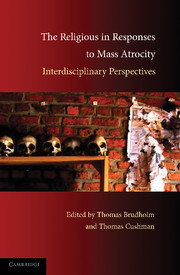Book contents
- Frontmatter
- Contents
- List of Contributors
- Acknowledgments
- Introduction: The Religious in Responses to Mass Atrocity
- Part I Between Necessity and Impossibility: The Role of Religion in the Face of Atrocity
- Part II Does It Help to Import Religious Ideas: Reflections on Punishment, War, and Forgiveness
- 4 Can We Punish the Perpetrators of Atrocities?
- 5 The Ethics of Forgiveness and the Doctrine of Just War: A Religious View of Righting Atrocious Wrongs
- 6 On the Advocacy of Forgiveness after Mass Atrocities
- Part III Sociologies of the Religious in Responses to Mass Atrocities
- Index
5 - The Ethics of Forgiveness and the Doctrine of Just War: A Religious View of Righting Atrocious Wrongs
Published online by Cambridge University Press: 01 September 2009
- Frontmatter
- Contents
- List of Contributors
- Acknowledgments
- Introduction: The Religious in Responses to Mass Atrocity
- Part I Between Necessity and Impossibility: The Role of Religion in the Face of Atrocity
- Part II Does It Help to Import Religious Ideas: Reflections on Punishment, War, and Forgiveness
- 4 Can We Punish the Perpetrators of Atrocities?
- 5 The Ethics of Forgiveness and the Doctrine of Just War: A Religious View of Righting Atrocious Wrongs
- 6 On the Advocacy of Forgiveness after Mass Atrocities
- Part III Sociologies of the Religious in Responses to Mass Atrocities
- Index
Summary
In talking about responses to atrocity, does it help to import religious ideas? Does the invocation of religious concepts give voice to otherwise inarticulate intuitions? Does the language of religion have the power to cast peculiar light on dark places here? These are the questions that this chapter will seek to address.
Good answers pay close attention to the terms of their questions. We begin, therefore, with an analysis of two terms: “atrocity” and “religion.” In common usage, “atrocity” refers to a kind of killing of human beings. If it is used to indicate the killing of nonhuman animals or the nonlethal maltreatment of human ones, then that use is secondary, analogous, and weaker. An “atrocious” killing is, of course, an immoral one. It is unrestrained, excessive, and merciless. More exactly, it is indiscriminate, taking the lives of noncombatants – women as readily as men – of infants and the elderly as easily as adults. Further, an “atrocity” is large in scale, involving the deaths of many. The “many” here could be a race – as in genocide – but need not be. They could also be a village or even a family. Since it would not normally describe the killing of a series of individuals by a peacetime criminal, it follows that “atrocity” typically points to the killing of many people in a single event during a war.
- Type
- Chapter
- Information
- The Religious in Responses to Mass AtrocityInterdisciplinary Perspectives, pp. 105 - 123Publisher: Cambridge University PressPrint publication year: 2009
- 1
- Cited by



